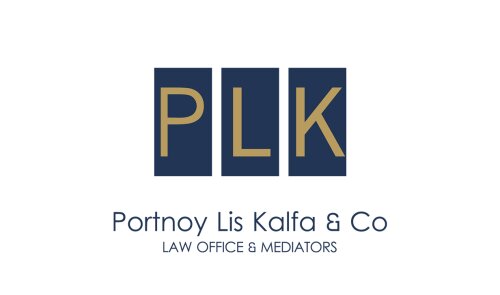Best Divorce & Separation Lawyers in Ashdod
Share your needs with us, get contacted by law firms.
Free. Takes 2 min.
Free Guide to Hiring a Family Lawyer
List of the best lawyers in Ashdod, Israel
About Divorce & Separation Law in Ashdod, Israel
Divorce and separation are significant life events that carry both emotional and legal challenges. In Ashdod, as in all of Israel, the process of ending a marriage is governed by unique local laws that may differ from other countries. The Israeli legal system handles divorce matters under both civil and religious jurisdictions, depending on the backgrounds and personal status of the spouses involved. Non-married couples and those seeking separation without formal divorce (such as common-law spouses) also have specific legal rights and obligations. Understanding your rights and obligations under the law is crucial for navigating this complex process.
Why You May Need a Lawyer
Divorce and separation involve important decisions that can impact your finances, property, and relationship with your children. Common situations where you may require legal help include:
- Negotiating child custody and visitation rights
- Dividing shared property, assets, and debts
- Determining spousal or child support payments
- Protecting yourself from claims or unfair treatment
- Enforcing or modifying existing agreements or court orders
- Handling international or cross-border issues, such as if one spouse is abroad
- Understanding which court or tribunal (Rabbinical Court, Sharia Court, or Family Court) has jurisdiction over your case
Legal representation can help you make informed decisions, avoid costly mistakes, and ensure your rights are protected throughout the divorce or separation process.
Local Laws Overview
Israel has a dual legal system for family law matters, combining religious and civil components. In Ashdod, the following are key aspects of divorce and separation law:
- Marriage and divorce for Jewish couples are handled by the Rabbinical Courts, in accordance with Jewish law (Halacha). Non-Jews or mixed couples have their matters decided in civil Family Courts or, in some cases, their own religious courts (such as Sharia or Christian courts).
- Property division is governed by the Spouses Property Relations Law, which typically mandates equal division of assets acquired during the marriage, unless they are excluded by a prenuptial or postnuptial agreement.
- Child custody decisions are based on the best interests of the child, with a growing trend toward shared parenting. Historically, there was a preference for maternal custody for young children, but this is evolving.
- Child and spousal support (alimony) are calculated according to the income and financial needs of the parties and children, with Rabbinical Courts using different criteria from civil courts.
- Either spouse can initiate divorce proceedings, but in the Rabbinical Court system, both parties must agree to the divorce for it to be finalized unless specific grounds are proven.
- Unmarried couples (yeduim batzibbur or common-law spouses) also have certain legal rights concerning property and sometimes custody or support.
Because of the overlap and interaction between various courts and laws, having knowledgeable legal counsel is often essential.
Frequently Asked Questions
How do I start the divorce process in Ashdod?
You can file for divorce either through the relevant religious court (such as the Rabbinical Court for Jews) or the Family Court. It is important to get legal advice to understand which court best serves your interests and what documentation you need.
What is the difference between a separation and a divorce?
Separation usually means living apart without ending the marriage legally, while divorce is the formal legal dissolution of the marriage. Couples may choose separation to arrange financial or custody matters before finalizing a divorce.
Which court handles my divorce case?
The appropriate court depends on your religious affiliation. Jewish couples must divorce in the Rabbinical Court, while others may use the Family Court or their respective religious courts. Sometimes there is a race to file first, since the court where the case is first filed may take precedence.
How is property divided after divorce?
Property acquired during the marriage is generally split equally unless a marriage contract states otherwise. Assets owned prior to marriage or received as a personal gift or inheritance can sometimes be excluded.
Who decides on child custody?
Child custody is determined based on the child's best interests. Courts may award sole or joint custody, with factors including the child’s welfare, age, and relationship with each parent.
What is the process for getting child support?
Either parent can request child support. The amount is determined based on each parent’s income, expenses, and the needs of the child. Both the Rabbinical and civil courts can order support payments.
Can I get divorced if my spouse refuses?
In the Rabbinical Court, a divorce may require mutual agreement unless you can prove grounds such as adultery or abuse. Proving valid grounds or negotiating through legal channels can help move the process forward.
Do I need a lawyer for divorce or separation?
While not mandatory, having a lawyer ensures that your rights and interests are protected, especially in complex cases involving children, assets, or contested issues.
How long does the divorce process take?
The process length varies depending on the cooperation of both parties, the complexity of issues, and the workload of the court. An uncontested divorce can proceed much more quickly than one with disputes.
What rights do unmarried partners have?
Common-law partners in Israel may have rights similar to married couples, especially regarding property, cohabitation, and sometimes custody or support. Legal recognition requires proof of a genuine and ongoing relationship.
Additional Resources
If you are dealing with divorce or separation in Ashdod, the following resources may be helpful:
- Family Court and Rabbinical Court offices in Ashdod - For submitting applications and seeking information about procedures
- Ministry of Justice Family Support Centers - Advice and mediation services for couples and families
- Legal Aid Department (Mishan) - Provides free or subsidized legal advice for those who qualify
- Municipal Social Services - Counseling and support for families and children dealing with separation or divorce
- New Israel Fund and WIZO - Non-profit organizations supporting families and women’s legal rights
Next Steps
If you are considering or going through divorce or separation in Ashdod, it is important to take the following actions:
- Gather all relevant documents, such as marriage certificates, financial records, and evidence of shared property
- Contact a qualified lawyer with experience in family law and local knowledge of Ashdod courts
- Consider mediation or counseling services if you wish to resolve disputes amicably
- Seek advice from relevant governmental bodies or non-profit organizations listed above if you need support
- Prepare emotionally and financially for the challenges ahead and protect your legal rights
Taking these steps early can help ensure a more informed and less stressful transition during divorce or separation.
Lawzana helps you find the best lawyers and law firms in Ashdod through a curated and pre-screened list of qualified legal professionals. Our platform offers rankings and detailed profiles of attorneys and law firms, allowing you to compare based on practice areas, including Divorce & Separation, experience, and client feedback.
Each profile includes a description of the firm's areas of practice, client reviews, team members and partners, year of establishment, spoken languages, office locations, contact information, social media presence, and any published articles or resources. Most firms on our platform speak English and are experienced in both local and international legal matters.
Get a quote from top-rated law firms in Ashdod, Israel — quickly, securely, and without unnecessary hassle.
Disclaimer:
The information provided on this page is for general informational purposes only and does not constitute legal advice. While we strive to ensure the accuracy and relevance of the content, legal information may change over time, and interpretations of the law can vary. You should always consult with a qualified legal professional for advice specific to your situation.
We disclaim all liability for actions taken or not taken based on the content of this page. If you believe any information is incorrect or outdated, please contact us, and we will review and update it where appropriate.









